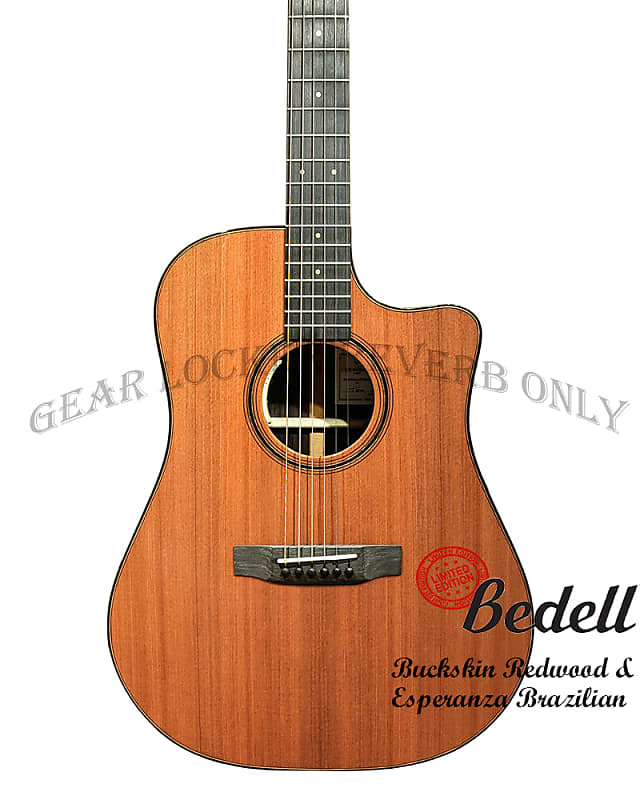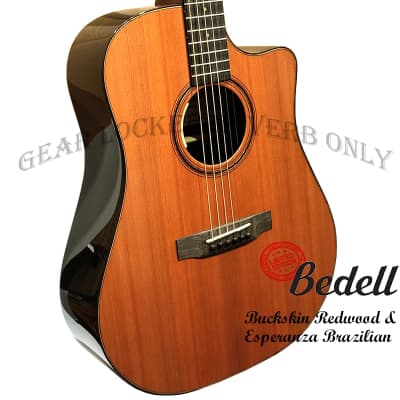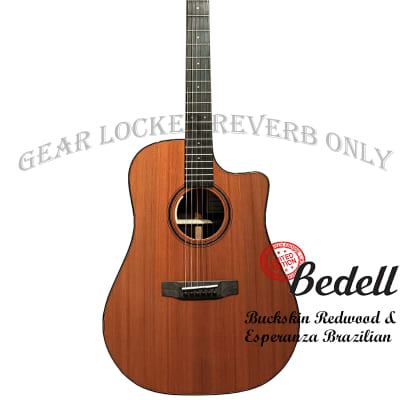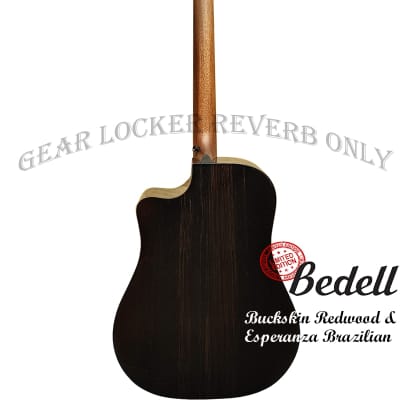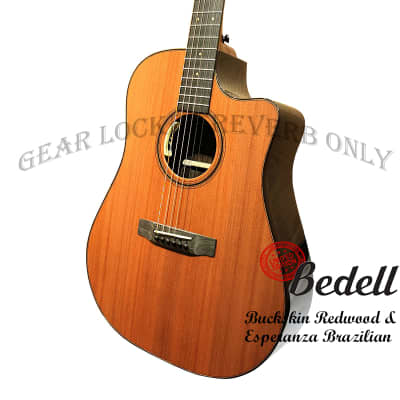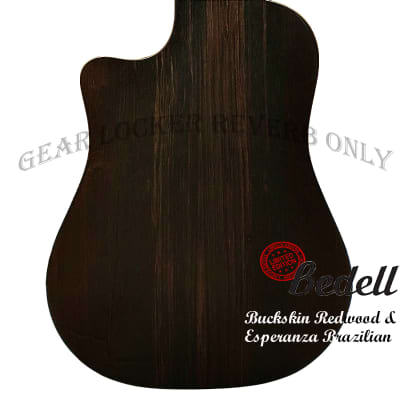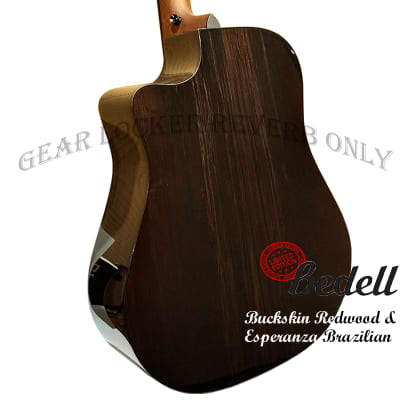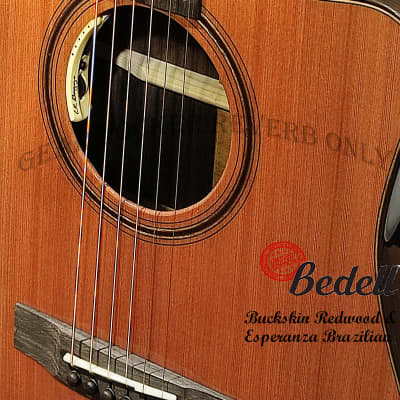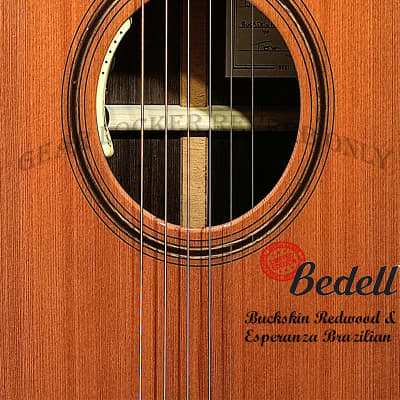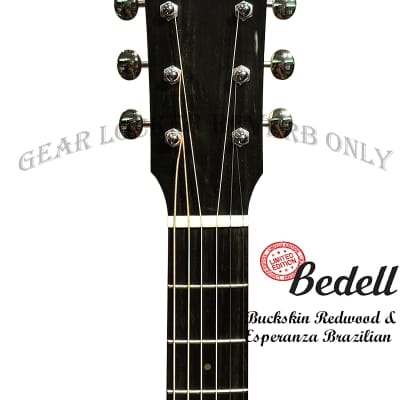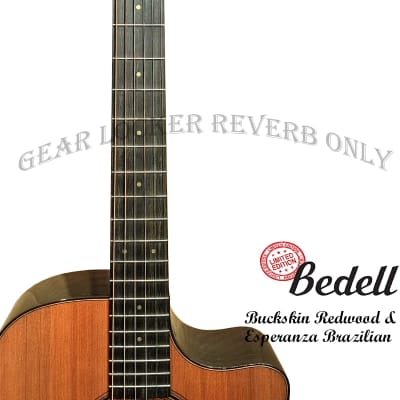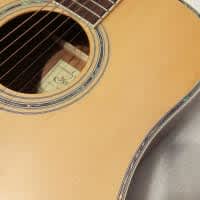LIMITED EDITION DREADNOUGHT CUTAWAY BUCKSKIN REDWOOD – ESPERANZA BRAZILIAN
Stiff, resonant redwood has all the vocal warmth of cedar, but allows significantly more headroom for when the urge to rock a little arises. The sustainable vertically-grained Buckskin redwood found in this Bedell limited edition rested on the forest floor, perhaps for hundreds of years, following some long ago thrashing in a Humboldt County winter storm. Its tone speaks of history and its subtle, leathery look is rugged and individualistic. Made to play, with a fast neck, L.R. Baggs Anthem electronics and sloped cutaway, the rare redwood is supported by elegant Esperanza rosewood, among the most beautiful, sonorous selections from Bedell’s unparalleled tonewood library. Play on!
BUCKSKIN REDWOOD
A light touch makes redwood talk, and the tallest trees have a lot to say. Redwood sounds vintage from the start, with rich overtones and a dynamic complexity drawn out by skilled fingers. Each string speaks, with strong note separation and a deep, crisp timbre.
BRAZILIAN ROSEWOOD
An endangered and carefully protected species, Brazilian rosewood (Dalbergia nigra) is the most precious of tonewoods. Simply called “rio” by Brazilians, it is highly regarded among luthiers and collectors for its magical tonal character and deep, rich beauty – and it is vigorously regulated; it is protected with the same level of regulation as ivory. Brazil – recognizing the value of its rosewood trees – outlawed the exportation of Brazilian rosewood logs in the late ‘60s. The ban was a blow to luthiers and guitar manufacturers worldwide, since it was widely believed that there was no better combination for acoustic guitars than Brazilian rosewood paired with spruce. From that point onward, fewer and fewer players would have the chance to own a Brazilian rosewood guitar, and most would have to settle for other rosewood substitutes… and if you’ve ever played an acoustic guitar crafted from Brazilian rosewood, you know there is no substitute.
In June of 1992, Dalbergia nigra was listed in Appendix I of CITES as an endangered species, preventing the import and export of the precious tonewood within 180 member nations, including all of Europe. Fortunately, years before the ‘60s Brazilian ban and decades before CITES, the trees that live again in the magnificent Bedell guitars were already safely resting and patiently aging in Spain.
Brazilian rosewood produces a loud, warm, rich tone, with full deep bases, brilliant trebles, delivering excellent sustain and clarity. Its appearance varies from brick red and burnt orange to shades of dark brown to violet color with black spidery streaks.
CONSERVATION OF BRAZIL’S ATLANTIC FOREST
The Atlantic Forest of Brazil (also known as the Mata Atlântica or the Atlantic Rainforest) is critically threatened. More than 85% of the original forest has been destroyed, however, Mata Atlântica still remains one of the richest, most biologically diverse forests, and is home to a large number of species that can be found nowhere else on the planet. Major threats to Mata Atlântica include illegal logging, conversion of forestland to agricultural uses, and urban and suburban development. Brazil’s eastern seaboard is home to 70% of Brazil’s population, so the fate of the forest flora and fauna is interwoven with economic wellbeing of the local population. Currently, less than 2% of the whole biome is under protected status.
HONDURAN MAHOGANY
Mahogany is a medium-lightweight wood, ranging in color from light brown to dark. It has a balanced, resonant tone with notable sustain. Mahogany delivers a thick bottom end, rich midrange, and controlled, warm top end.
Honduran mahogany (Swietenia macrophylla) trees prefer basking in the sunshine; they can tolerate a bit of shade, but they’re happiest and healthiest when their leaves have unfettered access to sunlight. The tree that supplied your tonewood probably grew in a low-elevation rainforest, in a bright, sunny location, in dry, well-drained soil, surrounded by other mahogany trees, possibly near a river or stream. Honduran mahogany trees are large, fast-growing, long-lived trees – in the wild they can live for a couple of centuries – so they make a great long-term habitat for height-loving animals and insects that live high in forest canopy. The flowers and fruits of the woody, vining plants that crawl up their trunks help sustain the canopy-dwelling creatures. These majestic trees provide shelter for birds like toucans and macaws, and pollen and nectar for bees and a wide variety of small butterflies. The fruit from these trees can be a meal for large parrots (while on the tree) and for tropical rodents like pacas and cutias (when the seeds fall to the ground). Honduran mahogany seedlings and saplings also support the rainforest ecosystem, including creepy crawly winged things – one species of moth has no other known food source.
Body Type : Dreadnought Cutaway
Neck wood : Honduran Mahogany
Top : Buckskin Redwood
Back & Side : Brazilian Rosewood
Fretboard : Ebony
Frets : 20
Nut Width : 1.687"
Waist Width : 15.75"
Body Length : 20"
Body Depth : 3.875"
Upper Bout Width : 11.437"
String : D' Addario EXP 17's
Binding : Tortoise
Inlay : 4mm Dots
Scale Length : 25.5"
Electronics : LR Baggs Anthem
Case : Bedell Custom Ameritage hardshell case
